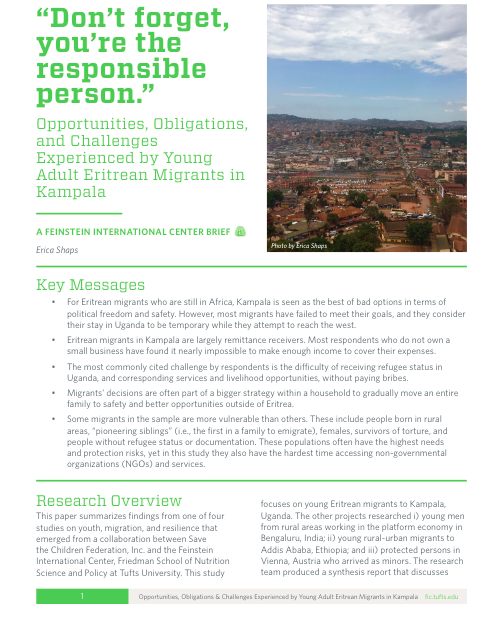As northern and western migration routes from Eritrea become less viable and appealing, the number of Eritrean migrants arriving to Uganda each year is growing, even in comparison to other destinations in sub-Saharan Africa. Due to Eritrea’s policy of forced military conscription, many of these migrants are teens and young adults traveling on their own.
This mixed methods descriptive study seeks to fill knowledge gaps on this topic by exploring the livelihood and protection strategies of young adult Eritrean migrants in Kampala, Uganda. It explores how migrants’ different journeys influence their resilience capabilities and overall well-being in Kampala. As part of this effort, this research explores the exceptional situation of Eritrean migrants who arrived in Uganda through an unofficial Israeli resettlement program. It also examines the unique and close ties between Eritrean communities in Kampala and Juba, South Sudan.
This study concludes that Eritreans who have yet to find a path to leave Africa for the West view Kampala as the best of bad options in terms of safety and quality of life. However, most of these migrants do not make enough income to cover expenses and depend heavily on remittances. Contrary to prevailing wisdom on migration, in this case significant remittances flow not from the migrants abroad to their families in Eritrea, but instead from Eritrea and Western countries to migrants in Kampala. This financial insecurity, coupled with the prevalence of corruption in the asylum-seeking process and security risks in Kampala, contribute to Eritrean migrants feeling uncomfortable and insecure in Uganda. The data illustrates that migrants from rural areas and “pioneering siblings” (those who are the first in their families to emigrate) are particularly vulnerable. Many of the challenges experienced by Eritrean migrants in Kampala require political solutions; however, practitioners can take steps to better support this population and identify young migrants who are most at risk.
The capstone based on this study is available here.







